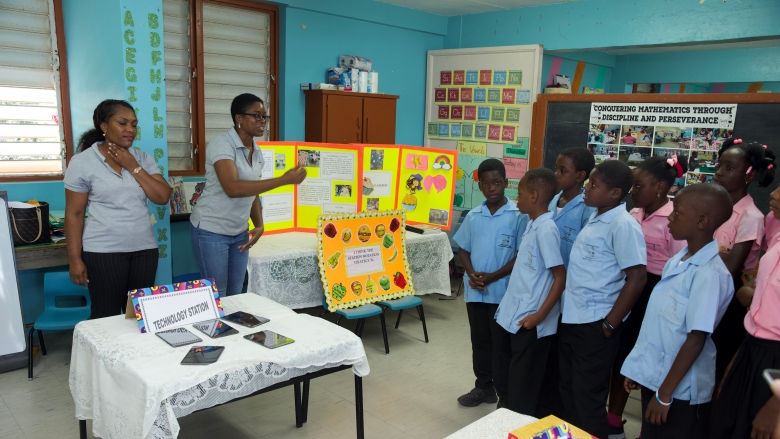Results
Project activities contributed to improved primary education quality in the four countries as evidenced by these outcomes:
- Each of the four participating countries established a National Professional Development (PD) Team and received technical support to develop a National PD Plan. These plans provide a roadmap for teacher training based on each country’s education priorities, desired approaches to professional development, and classroom observation and national learning assessment data. Sixty-seven percent of all primary teachers in the region (2,182 of 3,264) received certification from their ministries of education, reflecting completion of professional development activities to OECS standards.
- Over two academic years, teachers from primary schools across these countries were trained to integrate the learning standards and assessment framework into their daily classroom teaching. Follow-up support visits helped teachers plan lessons aligned with the learning standards and use formative assessments to make informed decisions about instructional strategies. In April 2019, 24 percent of all primary teachers in the region were observed using formative assessment in their classrooms to monitor students’ progress toward achieving the learning standards.
- A competency-based Professional Certification Program for Education Leaders was developed based on OECS School Leadership Standards. One hundred and ten primary school principals gained certification, presenting final projects demonstrating competencies developed during the program. By the end of the 2018–19 school year, 87 percent of all primary school leaders across the four countries had reported to Ministry officials on a set of leadership, teacher, and student performance metrics using a School Improvement Plan template designed under the project.
- Monitoring and evaluation (M&E) teams were trained in data collection and analysis methods, data management, process and outcome monitoring, and results reporting. Each country developed its own implementation plan for project activities and used a template designed under the project to track performance indicators in its system.
Bank Group Contribution
Hosted by the World Bank, the Global Partnership for Education, the only global partnership and fund dedicated entirely to helping children in the poorest countries receive a quality education, provided a US$2 million grant to finance this project. During the life of the project, the Bank worked closely with the OECS Commission’s Education Management Unit (EDMU), the implementing agency, in all aspects of project coordination, monitoring and evaluation, and fiduciary duties. Throughout the process, EDMU’s project management capacity was strengthened to such an extent that, by project close, the OECS Commission successfully became the GPE grant agent for a follow-up GPE Project. The Bank also provided extensive technical advice, drawing on its global knowledge and experience in the core areas of curriculum, teaching, and school leadership.
Partners
The Bank worked closely with the OECS Commission throughout the project. Contributions from other development partners, including the Caribbean Development Bank (CDB) and UNICEF, enabled EDMU to extend the project activities to other member states not eligible for GPE funds. Over the life of the project, the local education group—which provides oversight for GPE projects and includes the Bank, CDB, UNICEF, and other development partners—became increasingly formalized and active.
Beneficiaries
Project beneficiaries include the approximately 43,000 children attending primary schools in Dominica, Grenada, St. Lucia, and St. Vincent and the Grenadines. In addition, nearly 2,300 teachers and school leaders benefitted from participation in various professional development training activities under the project, as did members of M&E teams within each country’s ministry of education. Finally, all OECS member states—including those not eligible under GPE—now benefit from the regional public goods developed under the project: learning standards, assessment frameworks, teacher PD frameworks, and certification frameworks for school leaders.
Moving Forward
Project results are expected to be sustained as they align closely with the strategic imperatives of the OESS, which were recently extended for three more years. Activities piloted or partially achieved (e.g., formative assessment in the classroom) are being scaled up. The project also supported activities that strengthened the four countries’ education system capacities without creating recurrent costs for their ministries of education going forward.
